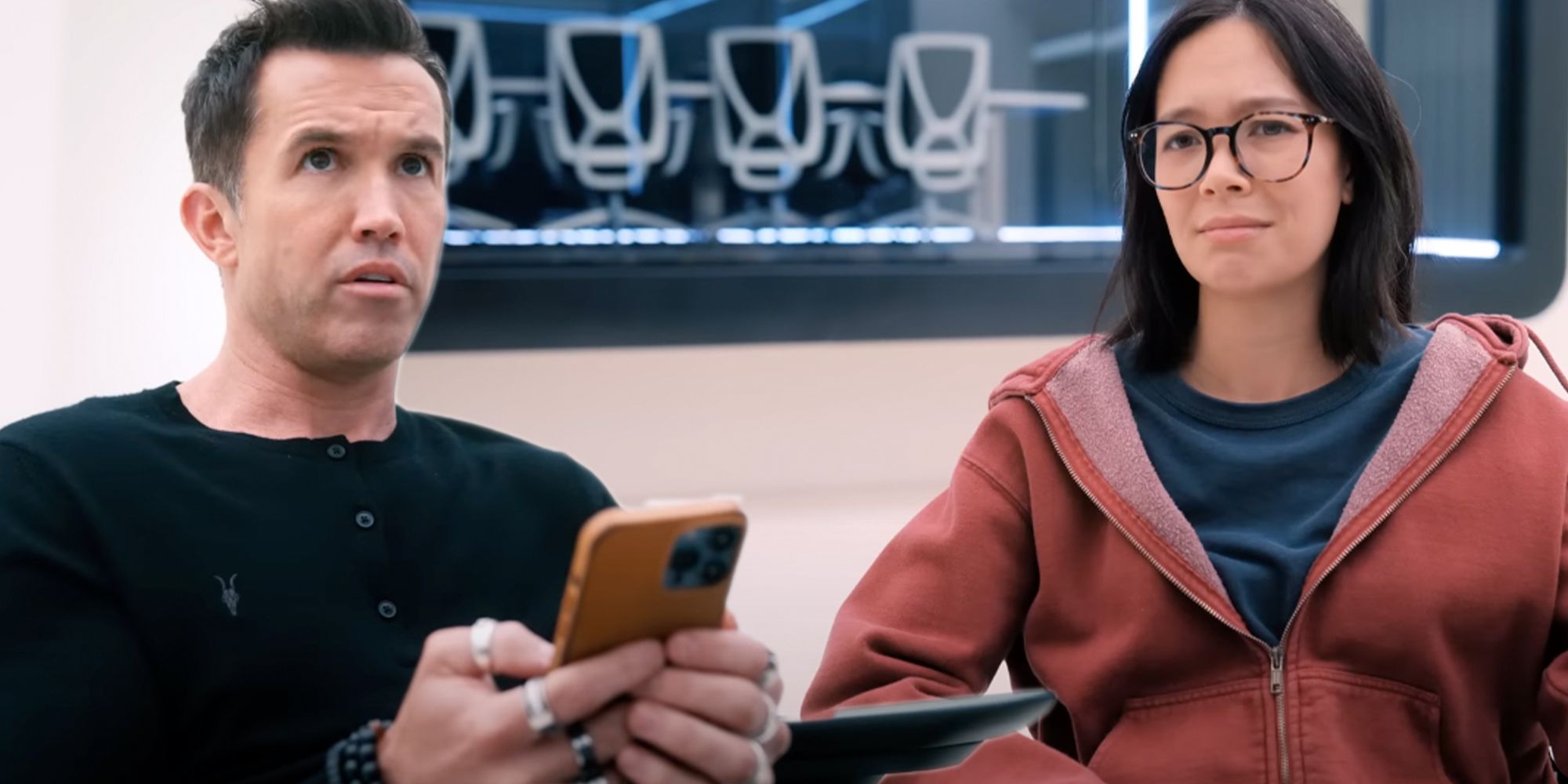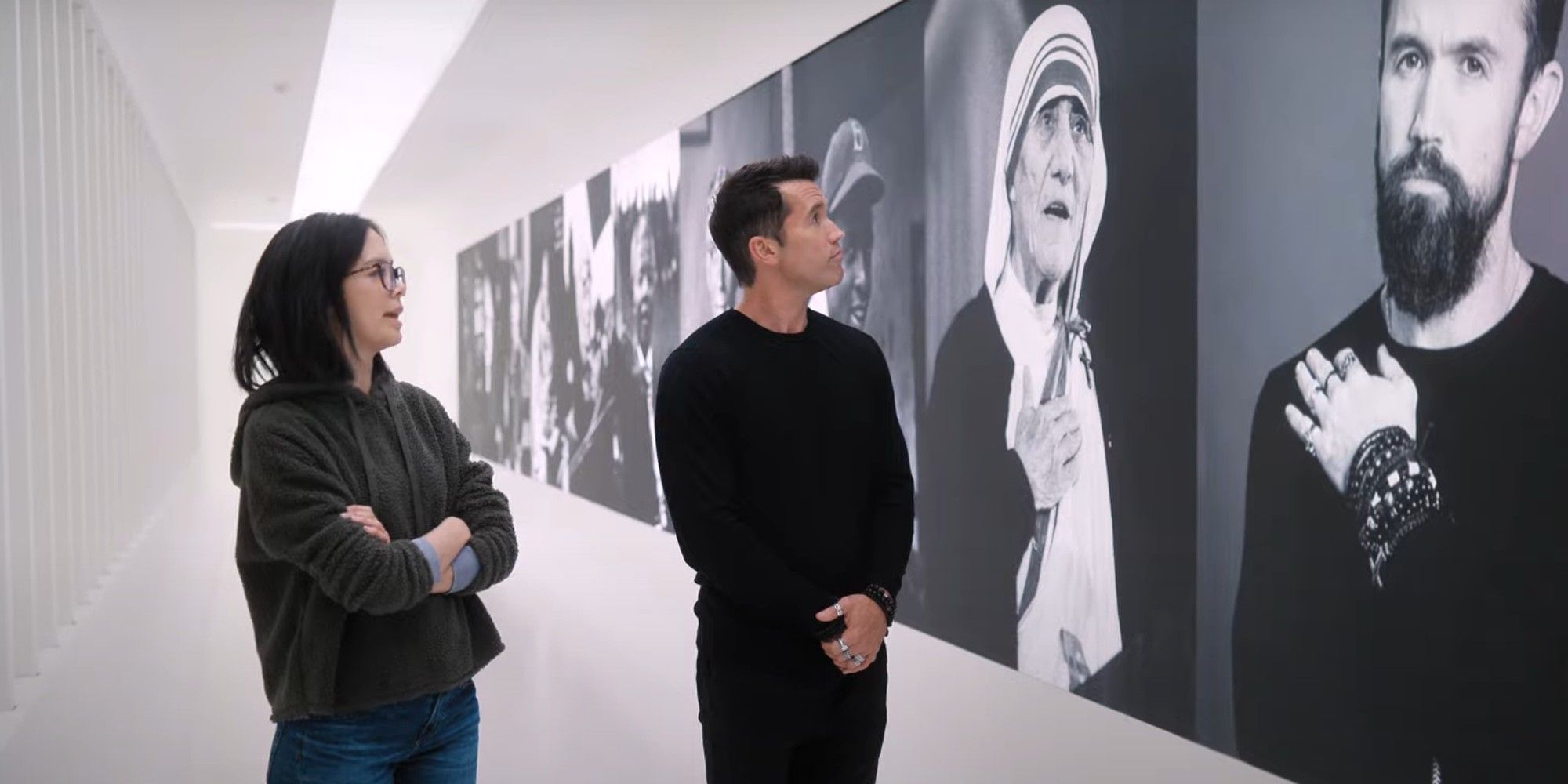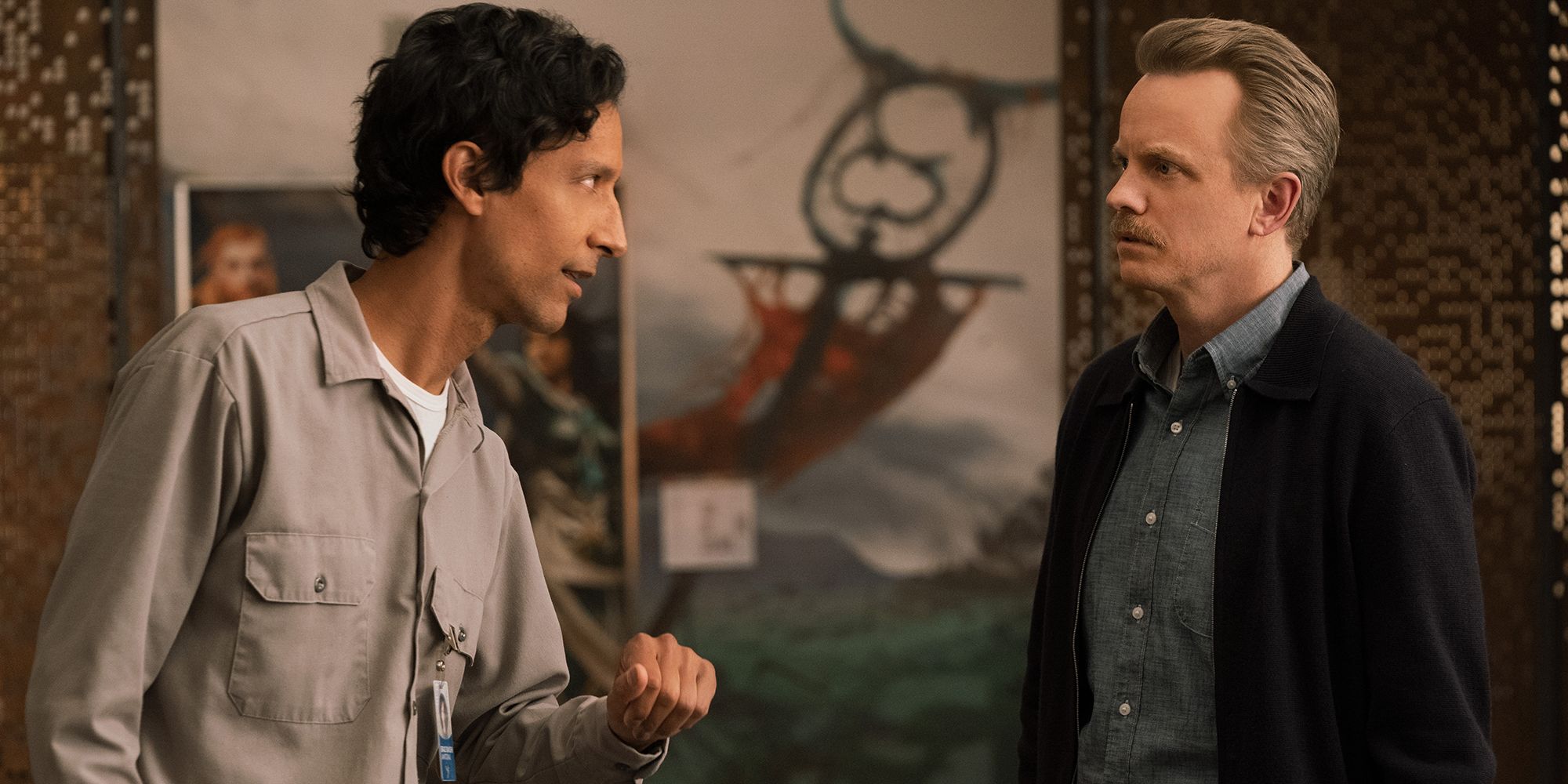Warning: Mild spoilers for Mythic Quest season 3 episode 7.Mythic Quest season 3 is in full swing, with its most recent episode "Sarian" continuing the show's trend of featuring one standalone episode per season. "Sarian'" which delves into the backstories of Poppy Li (Charlotte Nicdao) and Ian Grimm (Rob McElhenney), also arrives on the heels of a surprising announcement; a Mythic Quest spinoff series entitled Mere Mortals has been ordered by Apple, promising more stories in the vein of the original show's hit standalone offerings. Mere Mortals was created by Mythic Quest writers Ashly Burch, Katie McElhenney, and John Howell Harris, and will have David Hornsby, Rob McElhenney, Charlie Day, and Megan Ganz as executive producers.
In addition to co-creating Mythic Quest alongside Rob McElhenney and Charlie Day, Ganz has had a hand in some of the best television comedies of the last decade. Some of her credits include Community, Modern Family, The Last Man On Earth, and It's Always Sunny in Philadelphia, the latter of which she continues to work on with Day and McElhenney. Ganz even made her directorial debut with "Sarian", co-directing the episode with Todd Biermann.
Megan Ganz spoke with Screen Rant about the challenges of coming up with Mythic Quest's fantastic season 3 premiere, how the creators leaned into the show's standalone episodes (which explains Mere Mortals), and "Sarian".
Megan Ganz on Mythic Quest
Screen Rant: You had to deal with F. Murray Abraham leaving and a new season where all your characters are going through very big changes, all while also making it funny and emotional. How much of a challenge was that premiere episode?
Megan Ganz: It was basically like re-piloting the show. We had an experience, which I have to say I've had on other shows before, where you end a season and you think, "What's the biggest, coolest thing that we can do to end the season?" You're not thinking about the next season when you make that decision. You're sort of like, "Well, they'll figure it out," and then you forget that you are "they". You are the ones that are going to have to figure it out.
At the end of season two, we thought, "You know what would be really cool? If Poppy and Ian leave Mythic Quest. Wouldn't that be awesome?" Then, when we got to the beginning of season three, we were like, "Oh God. Well, we can't have two separate shows where nobody crosses with each other." It was a lot.
And then yes, we had to write off a major character, which is also a real challenge. "What do we do about C.W.? How do we end that character?" We talked about any version of it, from "Oh, we'll say he's off writing a book somewhere," but then we thought "Well, that doesn't seem like the character." We had created this real relationship of this family where everybody's together. So for them to just be like, "Oh, well, he's just gone, and nobody's thinking about it or caring about it," felt really false.
We also felt like maybe there was a step to be taken post-"Backstory!", where C.W. was passing on knowledge that he had learned over his life. In the episode from the previous season, "Backstory!", we find out he's a fraud, and his most successful book, which he won his Nebula Award for, he didn't even write. Then, in "Peter", he makes amends with his old friend, and also makes amends with the idea that maybe video game writing is his real talent. That he might not have been a talented sci-fi writer, but maybe he actually has found his place in video game writing.
In a way, we realized we had put that character in a place where he had kind of achieved the point of his life. He had gotten over his biggest embarrassment, his darkest secret, and he had kind of found peace. So we thought, "Well, can he pass that peace to our characters?" His one last message to them is, "It never gets better than this. You keep thinking that you're going to pull off something better, and you're missing what you have right now, which is family with these people who care about you. And I didn't value it, but now I do value it, and I just want to tell you guys to also value it." That was one thread that we were talking about, and we spent a lot of time talking about how to deal with that character, while also making it funny.
We were like, "We want him to go out in a blaze of glory, because we feel like that's what C.W. would do. He would have a very dramatic ending," but we thought it was also very funny that he doesn't realize that his ending is Thelma and Louise. He's just co-opted another story.
So we did that story, and then separately, we were like, "What are we going to do about the fact that we now have two separate offices? How are we going to make sure that our characters are still mixing?" We came upon the idea of them being literally one floor above. Being divided by only a floor. [We] thought that the funniest way to present that to the audience was that everybody's acting like they've scattered to the winds, and that they're two completely separate offices, and never the twain shall meet. [That] everybody's gone in their separate place, and they're brought together by this tragic event, and then [we reveal] that maybe they're not as far away as you think.
That gave us the ability to play forward into the season where people are going up and down, and they're getting involved in each other's business. And obviously, the second episode is all about Carol being infuriated that all these people that don't even work there anymore are still going around and causing mayhem that she's got to sort out. Once we hit upon that idea, we thought "That's a good way." We didn't want to start the season by just being like, "Oh, never mind, they got back together," because that would feel like it's not real, and that we had done that for no reason. We definitely wanted to keep them separate, but then give them an ability to where it felt like the two things were merging in some way. It took a very, very long time to figure out that episode for sure.
You mentioned "Backstory!" "Sarian" just came out, which is another beautiful standalone episode. How did doing episodes like these two become part of the DNA of the show?
Megan Ganz: Really, almost as a mistake. [For] season one, as we were breaking out all these stories about our characters, we thought "There's so much about the video game industry that we're not hitting on. So many stories we could be telling about the industry in general that we just don't have the time or space [to tell]." So then, we decided "What if we set aside an episode a year where we just comment on something in the video game world at large?"
Honestly, when we first started talking about it, we were talking about it as completely disconnected from the rest of the season. It would just be like a strange fluke episode. With streamers now, [people are] doing weird things with shows where you're allowed to take some weird flights of fancy where all of a sudden, you're doing a flashback episode.
We originally started talking about "A Dark Quiet Death" as a story about video game marketing, and how it has evolved over the '80s, '90s, and early 2000s. Video games took a downturn in the late '80s, so the marketing had to become more specific, and they started marketing directly toward men. And so, video games started becoming more violent, the video game ads were more sexual; they were really targeting men. It started this era of video games being thought of as a very male space, and I think there are still people that think that they are. The reality is that the numbers are actually closer to parity than you would think.
Anyway, we got into this whole conversation about video game marketing, [and] we thought it'd be kind of cool to watch a game go through its several versions, and how the marketing started eating the creative. That art versus commerce problem that people always have, where "I want to make money with my art," but then the money-making takes over what the creative was supposed to be of it. Then, [we] got to the point where broke out a story about that, and then Rob and his sister Katie - Katie was the writer on that episode - got the outline of it, and we're like, "Yeah, but why does anybody care about this? We find it interesting, but what's going to make your average viewer care?"
Then, [we] came upon the idea to insert a love story, so that what you're watching is not only the rise and fall of a game, but the birth and death of a relationship of two people. Once that became the structure of the episode, it really deepened the themes, and we realized that there was so much about that episode that applied to the season in general. You're watching Poppy and Ian and saying, "Are they going to end up the same way?" It's sort of a cautionary tale for what can happen to partners if they're not communicating effectively, [and] if they don't get past their own stuff and really learn how to work together. Then we came back to that in the last episode of the season with the carving of her name into the wall.
So, it didn't start as being about the thematics of the season; it kind of grew into that. Then, once that season came out and everybody loved that episode so much, we realized that the audience was really open to us doing that; they would go along with us if we wanted to take a weird journey with other characters. [However], we didn't just want to do the same thing again because we thought it wouldn't be surprising, so we thought, "This time, what if we took one of our characters and told the story about them, but in a different time period that would further inform their character?" That's where "Backstory!" came from. Again, the audience keeps telling us they like it, and so that's why we keep doing it.
It's so cool to see the backstories of Poppy and Ian in "Sarian". How much of their pasts had you already figured out or written as you were creating these characters a few years ago?
Megan Ganz: Ian's backstory of having a very abusive father, being raised by a father he hated, was a part of the show from early on. In season one, he tells Poppy that his dad put out a cigarette on his arm, and he changed his name from Ian ("EE-an") to Ian ("EYE-an") because his dad was named Ian and he hates his dad. So we had that as a part of his backstory, but really, it was more that we knew what the characters were now. What we did was say, like, "What past would create the characters that we currently have?"
I think a lot of the show is us bringing our own lives into it and talking about our own motivations, why we got into the creative space, [and] what things we're dealing with in our partnership and relationship. I have a similar relationship with Rob that Poppy and Ian share in that we're long-term partners who fight a lot, and have a lot of strong egos and belief that what we're doing is right, and at times get to a place where we're like, "God, I wish I didn't need you in this process. I could just do it without you, it would be so much easier." But then, [we realize], like, "Yeah, but it doesn't make the best product. The best product is made when we work together."
So, we just went back through, and we thought, "Poppy was probably a weirdo who was misunderstood by like her own family, and was definitely a video game addict from when she was younger." And [with] Ian, we know he had a really harsh background, and so it was just about fleshing those things out. Then, [it was] thinking about how that played into the last half of the season, and the baggage they're still bringing into their relationships, and what they're wanting the other to be that is really not appropriate to ask your creative partner to be in your life. It was all informed by that. And I guess we're all in therapy, so we've explored our stuff.
About Mythic Quest
Returning for its highly anticipated 10-episode third season this fall, “Mythic Quest” is the workplace comedy from creators Rob McElhenney, Charlie Day and Megan Ganz that follows a group of video game developers tasked with building worlds, molding heroes and creating legends, but the most hard-fought battles don't occur in the game — they happen in the office.
In season three, as Ian and Poppy navigate the gaming world and their partnership at the newly formed GrimPop Studios, Dana is forced to play mediator to her bosses’ incessant bickering. Back at Mythic Quest, David settles into his new role as the boss where he truly finds himself in charge for the first time with Jo returning as his assistant — more loyal and militant than ever; and Carol attempts to figure out where she fits in after a new promotion. At Berkeley, Rachel struggles to balance her morals with capitalism, while a post-prison Brad tries to return to society as a reformed man.
“Mythic Quest” is executive produced by McElhenney and Day under their RCG banner, Michael Rotenberg and Nicholas Frenkel on behalf of 3Arts, and Jason Altman, Danielle Kreinik and Gérard Guillemot for Ubisoft Film and Television. Hornsby and Ganz also executive produce. The series is produced for Apple TV+ by Lionsgate, 3 Arts Entertainment and Ubisoft.
Check out our other Mythic Quest interviews here:
- Charlotte Nicdao & Imani Hakim
- Danny Pudi & Naomi Ekperigin
- Ashly Burch & Jessie Ennis
- David Hornsby
New episodes of Mythic Quest are released on Fridays on Apple TV+.



